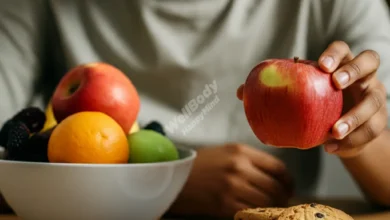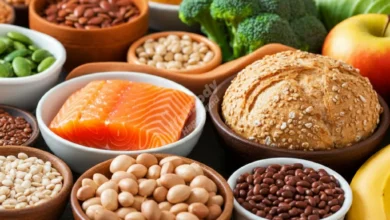Essential Vitamins for Maintaining Optimal Physical Health
I. Introduction
Vitamins: Your Body’s Tiny Heroes
Did you know your body needs 13 essential vitamins to stay healthy? These small but mighty molecules are key to keeping you fit and full of energy. Without them, your body would struggle with even the simplest tasks.
In this post, we’ll explore the vital role of vitamins in maintaining your physical health. You’ll learn which vitamins are crucial and how they help your body work at its best.
Why Should You Care About Vitamins?
Understanding vitamins is more than just health trivia. It’s about giving your body the tools it needs to thrive. By the end of this article, you’ll know how to:
- Identify important vitamins
- Understand their benefits
- Find good food sources for each vitamin
Ready to unlock the secrets of these tiny health boosters? Let’s dive in and discover how vitamins can help you feel your best!
II. Understanding Vitamins
What Are Vitamins?
Vitamins are essential nutrients that your body needs to work properly. Think of them as tiny helpers that keep your body running smoothly. Unlike fats, proteins, or carbs, you only need small amounts of vitamins. But don’t let their size fool you – they’re vital for your health!
Types of Vitamins
Vitamins come in two main types:
Fat-soluble vitamins: These are stored in your body’s fatty tissues. They include:
- Vitamin A
- Vitamin D
- Vitamin E
- Vitamin K
Water-soluble vitamins: Your body doesn’t store these, so you need to get them more often. They include:
- Vitamin C
- B-complex vitamins (like B1, B2, B3, B6, B12)
Here’s a simple table to help you remember:
| Fat-soluble Vitamins | Water-soluble Vitamins |
|---|---|
| A, D, E, K | C, B-complex |
| Stored in body fat | Not stored, need regular intake |
How Vitamins Work in Your Body
Vitamins are like little workers in your body. Each one has a special job:
- Some help turn food into energy
- Others keep your eyes, skin, or bones healthy
- Some vitamins help your blood clot when you get a cut
- Many vitamins support your immune system to fight off illness
Your body is like a busy factory, and vitamins are the workers that keep everything running smoothly. Without them, many important jobs wouldn’t get done!
III. Vitamin A
The Eye-Opening Benefits of Vitamin A
Vitamin A is a powerhouse nutrient that plays a crucial role in your health. Let’s explore its main benefits and where you can find it.
Keeping Your Eyes Sharp
Vitamin A is famous for its role in eye health. It helps you:
- See clearly in low light
- Maintain the health of your cornea (the clear front of your eye)
- Prevent night blindness
Think of vitamin A as your eyes’ best friend. It keeps them working well, especially when it’s dark outside.
Boosting Your Immune System
But vitamin A isn’t just for your eyes. It’s also a key player in your immune system. It helps:
- Create and activate white blood cells (your body’s defense team)
- Keep your skin and tissues healthy, forming a barrier against germs
Where to Find Vitamin A
You can get vitamin A from many tasty foods. Here’s a list of good sources:
- Orange and yellow vegetables: Carrots, sweet potatoes, pumpkin
- Green leafy vegetables: Spinach, kale, collard greens
- Fruits: Mangoes, cantaloupe
- Animal sources: Eggs, milk, liver
How Much Do You Need?
The recommended daily intake of vitamin A is:
- For adults: 700-900 micrograms (mcg) per day
- For children: 300-600 mcg per day (depending on age)
Remember, eating a balanced diet with plenty of colorful fruits and veggies is usually enough to meet your vitamin A needs.
IV. B-Complex Vitamins
The Energy-Boosting B Vitamins
B vitamins are like a team of superheroes working together to keep your body running smoothly. There are eight B vitamins, each with its own special powers.
Meet the B Vitamin Family
Here’s a quick rundown of the B vitamins:
- B1 (Thiamine)
- B2 (Riboflavin)
- B3 (Niacin)
- B5 (Pantothenic acid)
- B6 (Pyridoxine)
- B7 (Biotin)
- B9 (Folate)
- B12 (Cobalamin)
Key Functions: Your Body’s Power Plants
B vitamins are crucial for:
- Energy production: They help turn the food you eat into energy your body can use.
- Metabolism: B vitamins keep your metabolism humming along.
- Brain function: They support healthy brain and nerve cells.
- DNA production: Some B vitamins help make and repair DNA.
Where to Find B Vitamins
You can get B vitamins from many foods. Here’s a list for each:
- B1: Whole grains, pork, fish, beans
- B2: Milk, yogurt, eggs, leafy greens
- B3: Chicken, tuna, lentils, peanuts
- B5: Avocados, mushrooms, sweet potatoes
- B6: Potatoes, bananas, chickpeas
- B7: Eggs, nuts, sweet potatoes
- B9: Leafy greens, citrus fruits, beans
- B12: Meat, fish, eggs, dairy products
How Much Do You Need?
The recommended daily intake varies for each B vitamin. Here’s a quick guide for adults:
- B1: 1.1-1.2 mg
- B2: 1.1-1.3 mg
- B3: 14-16 mg
- B5: 5 mg
- B6: 1.3-1.7 mg
- B7: 30 mcg
- B9: 400 mcg
- B12: 2.4 mcg
Remember, a balanced diet with a variety of foods usually provides enough B vitamins. If you’re concerned about your intake, talk to your doctor.
V. Vitamin C
The Immunity-Boosting Superstar
Vitamin C is perhaps the most famous of all vitamins. It’s known for its powerful immune-boosting properties, but that’s just the start of what this amazing nutrient can do for your body.
Antioxidant Power
Vitamin C is a potent antioxidant. But what does that mean?
- It protects your cells from damage
- Fights harmful molecules called free radicals
- Helps keep your body healthy and young
Think of vitamin C as your body’s personal bodyguard, fending off harmful invaders.
Immune System Support
When it comes to your immune system, vitamin C is a true champion:
- Stimulates the production and function of white blood cells
- Helps your immune system work more efficiently
- May shorten the duration of common colds
Skin’s Best Friend
Vitamin C isn’t just good for your insides. It’s great for your skin too:
- Helps produce collagen, keeping your skin firm and youthful
- Protects against sun damage
- May reduce wrinkles and dry skin
Vitamin C-Rich Foods
Getting enough vitamin C is easy and delicious. Here are some top sources:
- Citrus fruits (oranges, lemons, grapefruits)
- Berries (strawberries, blueberries)
- Tropical fruits (kiwi, papaya, pineapple)
- Vegetables (bell peppers, broccoli, Brussels sprouts)
- Leafy greens (spinach, kale)
How Much Do You Need?
The recommended daily intake of vitamin C is:
- For adults: 65-90 mg per day
- For smokers: Add an extra 35 mg per day
Remember, your body can’t store vitamin C, so you need to get it regularly through your diet.
VI. Vitamin D
The Sunshine Vitamin
Vitamin D is unique among vitamins because your body can make it when your skin is exposed to sunlight. That’s why it’s often called the “sunshine vitamin”. But don’t be fooled – this vitamin is crucial for more than just sunny days!
Building Strong Bones
One of vitamin D’s most important jobs is helping your body absorb calcium:
- Works with calcium to build strong bones
- Helps prevent osteoporosis (weak, brittle bones)
- Important for muscle function and balance
Think of vitamin D as the foreman on your body’s bone-building construction site.
Boosting Your Immune System
Vitamin D is also a key player in your immune system:
- Helps activate immune cells
- May reduce your risk of infections
- Could help protect against autoimmune diseases
Sources of Vitamin D
You can get vitamin D in three main ways:
Sunlight: Your skin makes vitamin D when exposed to sunlight
- 10-30 minutes of midday sun exposure, several times per week, is often enough
Foods:
- Fatty fish (salmon, tuna, mackerel)
- Egg yolks
- Fortified foods (some milk, orange juice, and cereals)
Supplements:
- Especially important for people who don’t get much sun exposure
How Much Do You Need?
The recommended daily intake of vitamin D is:
- For adults up to age 70: 600 IU (15 mcg)
- For adults over 70: 800 IU (20 mcg)
Vitamin D Deficiency Risks
Not getting enough vitamin D is common, especially in:
- Older adults
- People with darker skin
- Those who live in areas with less sunlight
- People who are overweight or obese
If you’re concerned about your vitamin D levels, talk to your doctor. They might recommend a blood test or supplements.
VII. Vitamin E
The Antioxidant Powerhouse
Vitamin E is a fat-soluble vitamin that acts as a powerful antioxidant in your body. It’s like a shield, protecting your cells from damage caused by harmful molecules called free radicals.
Skin’s Natural Defender
Vitamin E is often called the “beauty vitamin” because of its role in skin health:
- Protects skin cells from UV light damage
- Helps in the formation of collagen, keeping skin elastic
- May reduce signs of aging, like wrinkles and age spots
Think of vitamin E as your skin’s personal bodyguard, fending off environmental stressors.
Heart Health Helper
Vitamin E might also be good for your heart:
- May help prevent the formation of blood clots
- Could reduce the risk of heart disease
- Might lower inflammation in the body
However, more research is needed to fully understand these benefits.
Food Sources of Vitamin E
You can find vitamin E in many delicious foods:
- Nuts (almonds, peanuts, hazelnuts)
- Seeds (sunflower seeds, pumpkin seeds)
- Vegetable oils (sunflower, wheat germ, safflower oil)
- Green leafy vegetables (spinach, broccoli)
- Avocados
How Much Do You Need?
The recommended daily intake of vitamin E for adults is:
- 15 mg (or 22.4 IU) per day
Most people can get enough vitamin E through a balanced diet.
A Word of Caution
While vitamin E is important, more isn’t always better:
- High doses from supplements can increase bleeding risk
- It may interact with certain medications
Always talk to your doctor before starting any new supplement regimen.
VIII. Vitamin K
The Clotting Vitamin
Vitamin K might not be as famous as some other vitamins, but it plays a crucial role in your body. It’s best known as the “clotting vitamin” because of its important job in blood clotting.
Blood’s Best Friend
Here’s why vitamin K is so important for your blood:
- Helps your blood clot when you get a cut
- Prevents excessive bleeding
- Works with proteins to stop bleeding quickly
Think of vitamin K as the first responder when you get a cut or bruise.
Building Strong Bones
But vitamin K isn’t just about blood. It’s also vital for bone health:
- Helps produce proteins needed for bone formation
- Works with vitamin D to help your bones absorb calcium
- May help reduce the risk of fractures
Food Sources of Vitamin K
You can get vitamin K from many healthy foods:
- Green leafy vegetables (kale, spinach, collard greens)
- Broccoli and Brussels sprouts
- Vegetable oils (soybean oil, canola oil)
- Some fruits (blueberries, figs)
- Meat, cheese, and eggs (in smaller amounts)
How Much Do You Need?
The recommended daily intake of vitamin K is:
- For adult men: 120 micrograms (mcg)
- For adult women: 90 mcg
Most people get enough vitamin K through their diet without needing supplements.
A Note of Caution
If you’re taking blood-thinning medications, it’s important to keep your vitamin K intake consistent and talk to your doctor about it. Sudden changes in vitamin K levels can affect how these medicines work.
IX. Tips for Maintaining Optimal Vitamin Levels
Eating Your Way to Vitamin Balance
Keeping your vitamin levels in check doesn’t have to be complicated. Here are some simple tips to help you maintain optimal vitamin levels through your diet and lifestyle choices.
1. Embrace a Balanced Diet
The best way to get your vitamins is through a varied, nutrient-rich diet:
- Eat a rainbow of fruits and vegetables daily
- Include whole grains, lean proteins, and healthy fats in your meals
- Don’t skip food groups unless advised by a healthcare professional
2. Consider Supplements Wisely
While a balanced diet is ideal, sometimes supplements can help:
- Consult your healthcare provider before starting any supplement regimen
- Supplements may be beneficial if you:
- Follow a restricted diet
- Are pregnant or breastfeeding
- Are over 50 years old
- Have certain health conditions
Remember: Supplements should complement, not replace, a healthy diet.
3. Be Aware of Vitamin Absorption Factors
Several factors can affect how well your body absorbs vitamins:
- Age: As you get older, your body may not absorb some vitamins as efficiently
- Medications: Some drugs can interfere with vitamin absorption
- Health conditions: Certain illnesses can impact vitamin uptake
- Cooking methods: Some vitamins are sensitive to heat or water
Quick Tips for Better Vitamin Absorption
| Tip | Benefit |
|---|---|
| Pair fat-soluble vitamins (A, D, E, K) with healthy fats | Improves absorption |
| Don’t overcook vegetables | Preserves water-soluble vitamins |
| Eat iron-rich foods with vitamin C | Enhances iron absorption |
| Get some sun exposure | Helps your body produce vitamin D |
4. Listen to Your Body
Pay attention to how you feel. If you’re consistently tired, have brittle nails, or notice other changes, it could be a sign of a vitamin deficiency. Always consult with a healthcare professional if you have concerns.
Remember, maintaining optimal vitamin levels is about consistency and balance. Small, sustainable changes to your diet and lifestyle can make a big difference in your overall health and well-being.
X. Conclusion
Vitamins: Your Partners in Health
As we’ve explored throughout this article, vitamins are essential for maintaining optimal physical health. Let’s recap the key points:
- Vitamins are crucial nutrients that support various bodily functions.
- From vitamin A keeping your eyes sharp to vitamin K helping your blood clot, each vitamin plays a unique and important role.
- B-complex vitamins work together to boost your energy and metabolism.
- Vitamin C is your immune system’s best friend and a powerful antioxidant.
- Vitamin D, the sunshine vitamin, is vital for strong bones and overall health.
- Vitamin E protects your cells and may benefit your heart and skin.
Remember, the best way to get your vitamins is through a balanced, varied diet rich in fruits, vegetables, whole grains, and lean proteins. While supplements can be helpful in some cases, they should never replace a healthy diet.
Your Next Steps
- Evaluate your diet: Are you getting a good mix of vitamin-rich foods?
- Consider your lifestyle: Do you get enough sunlight for vitamin D?
- Talk to a healthcare provider: If you’re concerned about your vitamin levels, consult a professional.
By paying attention to your vitamin intake, you’re taking an important step towards better health. Remember, small, consistent changes can lead to big improvements in your overall well-being.
Here’s to your health, powered by the amazing world of vitamins!
XI. FAQs
Here are some common questions about vitamins, along with simple answers:
1. Can I get all the vitamins I need from food alone?
Yes, in most cases. A balanced diet with a variety of fruits, vegetables, whole grains, lean proteins, and healthy fats can provide all the vitamins you need. However, some people may need supplements due to age, health conditions, or dietary restrictions. Always consult with a healthcare provider before starting any supplement regimen.
2. Are natural vitamins better than synthetic ones?
Not necessarily. Your body can use both natural and synthetic vitamins. The key difference is that natural vitamins from food often come with other beneficial nutrients. However, synthetic vitamins in supplements can be helpful when you can’t get enough from your diet alone.
3. Can taking too many vitamins be harmful?
Yes, it’s possible to overdo it with vitamins, especially fat-soluble ones (A, D, E, K) that your body stores. Excess intake can lead to toxicity. That’s why it’s important to follow recommended daily intakes and consult with a healthcare provider before taking high-dose supplements.
4. Do vitamins expire?
Yes, vitamins can expire. Over time, they may lose potency. Always check the expiration date on supplement bottles and store them as directed (usually in a cool, dry place). For vitamins in food, proper storage and consumption before spoilage is key.
5. How do I know if I have a vitamin deficiency?
Vitamin deficiencies can cause various symptoms, including:
- Fatigue
- Weak immune system (frequent illnesses)
- Hair loss
- Dry skin
- Brittle nails
- Mouth ulcers
However, these symptoms can also indicate other health issues. If you suspect a deficiency, it’s best to consult with a healthcare provider. They may recommend blood tests to check your vitamin levels.



